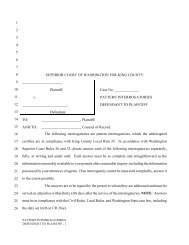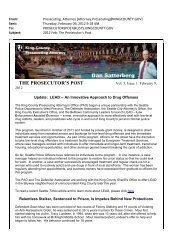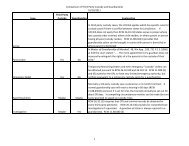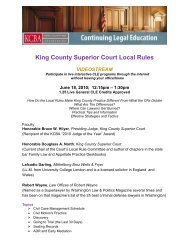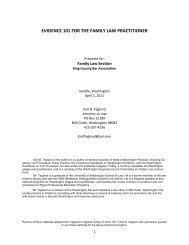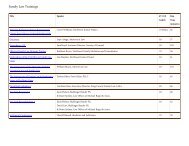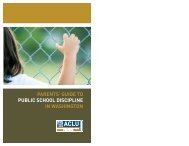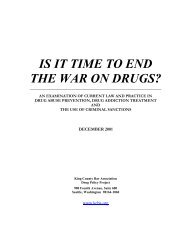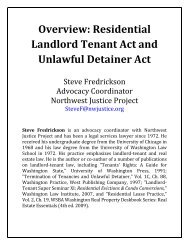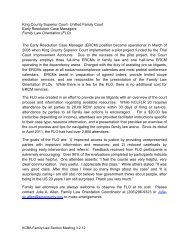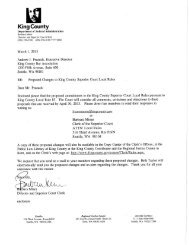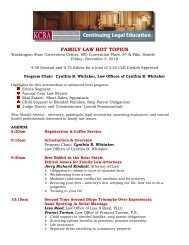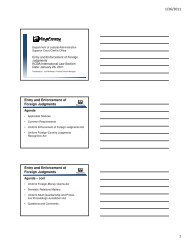Effective Drug Control: Toward A New Legal Framework
Effective Drug Control: Toward A New Legal Framework
Effective Drug Control: Toward A New Legal Framework
You also want an ePaper? Increase the reach of your titles
YUMPU automatically turns print PDFs into web optimized ePapers that Google loves.
Todd Austin Brenner, a managing partner at the law firm Brenner, Brown, Golian<br />
and McCaffrey Co. in Ohio, supports phased legalization, cannabis first, in a manner very<br />
similar to alcohol regulation, proceeding then to all narcotics. Some drugs such as heroin<br />
and crack would be banned from sale but available free of charge at clinics where<br />
registered addicts could obtain them. Brenner speculates that more education and<br />
emphasis on health-consciousness and value of personal choice will reduce problematic<br />
drug use. 479<br />
Taylor Branch, a national authority on America’s civil rights movement, also<br />
espouses taxing and regulating drugs. His plan would license private distributors<br />
carefully and tax the drugs as heavily as possible, ideally to the point just short of<br />
creating a criminal black market. There would be no prescription requirement and a ban<br />
on commercial advertising for harmful drugs, even though their sale would be legal.<br />
Police powers would be concentrated on two tasks: prohibiting sales to children and<br />
enforcing strict sanctions against those who cause injury to others while under the<br />
influence. Branch feels that people do not believe government warnings about<br />
psychoactive drugs, and getting the public to trust such warnings would be an important<br />
step toward reducing use. For example, the rate of tobacco smoking has dropped<br />
dramatically because people came to accept the health warnings. 480<br />
Richard B. Karel, in his “Model <strong>Legal</strong>ization Proposal,” argues that crack cocaine<br />
should not be legalized, hoping that its use will be substituted by other available forms of<br />
cocaine, including a cocaine chewing gum similar to nicotine gum used to help smokers<br />
to quit. He also sees the benefit of distributing cocaine in a clinical setting, but also<br />
allowing an ATM-type system where users would need to acquire a card that only<br />
allowed them to acquire the drug every 48 to 72 hours. He mentions that while opium<br />
was used in the late nineteenth and early twentieth centuries to treat alcoholics, U.S. drug<br />
policy of banning opium smoking has now led to dangerous forms of opiate use, such as<br />
intravenous heroin. Therefore, Karel believes that smokable opium should be made<br />
available in a similar fashion as the cocaine gum with ATM cards. PCP should remain<br />
illegal, hopefully substituted by other drugs that are available. Pyschedelics should be<br />
available to whoever can demonstrate the knowledge as to their effects, through such<br />
methods as a written examination, screening test and interview. 481<br />
Arnold Trebach, Professor Emeritus at the American University in Washington,<br />
D.C. and former president of the <strong>Drug</strong> Policy Foundation (now <strong>Drug</strong> Policy Alliance),<br />
advocates for the immediate repeal of drug prohibition, much in the way alcohol<br />
prohibition ended in the 1930s. Trebach believes that all currently illicit drugs should be<br />
treated the way alcohol is treated and wishes to turn back the clock to before opium<br />
smoking was outlawed, with sensible regulations regarding purity, labeling, places and<br />
hours of sale, and age limits for purchasers. 482<br />
Ethan Nadelmann, the executive director of the <strong>Drug</strong> Policy Alliance, has spent<br />
decades writing about alternatives to drug prohibition, and proposed a model whereby the<br />
government would distribute drugs through a mail-order system, also known as the “right<br />
of access” model. Local jurisdictions could still prohibit the sale and public consumption<br />
of drugs but would have to acknowledge the right of access for all adults. He believes<br />
this system would make it difficult for people to obtain the drugs despite their legal



